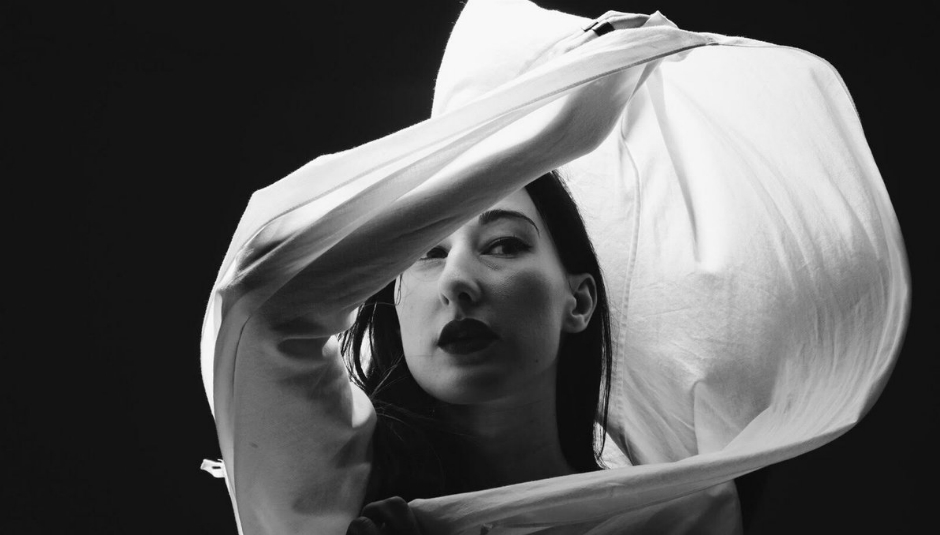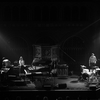As Zola Jesus, Nika Roza Danilova often applies pop music as an effective Trojan horse to highlight and explore the darker human impulses and traits. That being said, latest LP Okovi represents a drastic about-face for Danilova’s MO. The cover art shows her image obscured by a blotch of dark ooze, a natural force as untamable as the smoke monster from Lost. The only thing visible is Danilova’s thousand-yard stare, as if straining to retain some semblance of a human shape. Okovi bleeds out all of Danilova’s musical DNA without contrivance: the pouncing industrial leanings, the grandiose orchestration and, of course, that formidable voice – like a pillar of chiseled diamond – penetrating through it all.
Danilova is an all-consuming individual. Her wide range of interests reveals a true savant, a person who immerses herself into a new obsession every week. During a thirty-minute conversation with DiS, she mentions – among many other things – her fascination with Japanese Butoh dance, Eastern European choir music, Italian black metal and video games. One of the instrumental songs on Okovi is called ‘Half-Life’, named after the sci-fi first-person shooter franchise. The gaming industry has been under heavy public scrutiny recently with its misogynist tropes and Gamergate. Nevertheless, hearing Danilova talk about organizing LAN parties in her youth, you get the sense she always relished engaging with even the most fickle quandaries forced upon her by the outside world.
Okovi, however, marks the first time Danilova didn’t find answers by giving into cerebral, or even emotional, impulses. Shaken by both inner and outer turmoil, she spiraled into this knee-jerk compulsion to write. This time there was no clear incentive, template, or preordained vision at hand. The darkness simply became too omnipresent around her. A close friend of hers tried to commit suicide twice, another became terminally ill. When she was still living in Seattle, Danilova found herself submerged in anxiety, disillusion, and emptiness. “I felt lost, I felt meaningless. Like nothing I did mattered. Life wasn’t surprising me anymore. I was never suicidal, but I was feeling very depressed. And everything just weighs down on you. I couldn’t leave the house because that just gave me anxiety.”
Danilova’s reaction was to remove herself to a familiar sanctuary: the sweeping woodland area in Wisconsin where she grew up. What spawned from that self-imposed isolation was a record that superimposes images of dread and pain, often unfolding in such fearlessly direct ways it makes you wince. It’s the musical equivalent of a good David Cronenberg movie which, unsurprisingly, is yet another one of Danilova’s staple influences.
DiS: Is your Russian and Ukrainian background still pervasive in your family?
Nika Roza Danilova: I had to chase down a lot of that history and culture by myself. No one in my family wants to talk about it. My grandmother would come over and make borscht. But generally speaking, I almost know more about Russian culture myself than my parents do now. My parents have become very Americanized. I think some people don’t want to preserve their culture, their ancestry, or even preserve their family history. But I found those things to be important.
Have you found out how your family ended up in the States?
Yeah, Stalin’s hammer was coming down on them pretty hard. That’s how they moved to North Dakota and continued farming there.
You say your family is Americanized, but have you ever felt a sense of displacement on your own?
You mean, personally? Yeah, I definitely struggled with connecting to people. I think that’s part of being inherently an introvert, feeling innately uncomfortable and awkward being around others. I think that’s just who I naturally am as a person.
Okovi is a very intrusive record. But you obviously spent some time and distance from the album waiting for it to be released. Did you have a clear sense of what kind of record was going to become?
No, I didn’t. The past couple of years were really intense. A lot has happened. I would write music along the way, but I never thought it was good enough to put on a record. But once I realized the music itself is the journey, I realized suddenly I had a lot of material ready that told a story. That music was all written for the record, but it felt like it was merely a collection of bits and pieces. Some of the songs didn’t feel real. The last song of the record, ‘Half-Life’, which is an instrumental track, I loved, but it didn’t feel like a real song.
Why did you call the track ‘Half-Life’?
Well, for one, I wrote it during a really dark time. Someone very close to me attempted suicide. So it felt like that person was living a half-life, not so much alive, not so much dead. But also, the video game Half-Life.
What’s your opinion of video games as an art form? What games have impressed you apart from just playing them?
Video games are very immersive. It’s literally a fictional world you can dive into. I play them a lot on tour, just to help pass the time. There’s a game called SOMA, which is a bit like a Half-Life – well, I wouldn’t say it’s a ripoff. It’s alien, dystopian, and futuristic, but illustrated more subtlety. As a kid, I would play Counter Strike and Diablo. I’d go to LAN parties where people would put up all their computers and play together.
I miss the days where you could actually die in video games, when you feared that ‘Game Over’ screen. Nowadays in these immersive virtual worlds, I feel they dumbed down the challenge in gaming. As a result, you jolt off into boredom or just endlessly explore this fictional world. But, to challenge that assessment, I think that’s a great metaphor for any creative process; to fully explore a world and allow yourself to die a million deaths.
Oh yeah, definitely. On this record I definitely allowed myself to do this more than on my previous ones. I was like: I’m going to write a song, work on it without pressure and without overthinking things. Sometimes I can overthink a lot. I think the songs turned out better because of that. I just kept switching from inside to outside and made sure my brain wasn’t involved.
Shutting yourself off in the middle of nature kind of quiets some impulses. But how do you manage that in a busier environment?
It’s hard. I just was in New York for a week, and it brings so much tension and anxiety. I constantly ask that of people who live in cities. Do they ever just stay at home? Do they feel okay? Because that restless energy of the city is always all around you. I remember living in Los Angeles and never being able to stay calm. There was always a low-level tension happening inside of me. So I needed to physically remove myself.
You went to a very secluded place again. And you built a house.
It was a total family effort, a labour of love. And at the same time just watching something develop from the ground up reminded me a lot of making a record. Just a bigger version of it.
So you were well-removed, but people close to you on the other side still suffered in various ways. But then you feel that chasm, right? Did that helplessness spark your drive to write music as a coping mechanism?
There was so much sadness all around, not just from me but from the people around me. It almost made me want to write more and more. All these people were going through these things simultaneously. They were stuck in their own prison. So I wanted to link them all together. We were all going through the same thing, but separately and in different ways. Ultimately, it comes from that same muscle. That’s kind of what Okovi is about: a compilation of different people tied to something.
My favorite song on the album, ‘Soak’, engulfs the listener in a frightening ‘What if?’ situation. This hypothetical situation of being a murder victim provokes a form of resistance. And as harrowing as the fear of facing death is, it can serve as an emotional defibrillator. Exploring these different sides of facing death in a very personal space, did that help you ease out of your own doldrums?
Yeah, and I think in other ways too. I only realized after writing ‘Soak’ that the song mirrors my own struggles. Because I say so many things like, I can’t think of the words… [pauses] Look, this is how I was feeling – not just by writing that song – but in general: why bother doing anything if you can’t do it right? Or do it to the point that you want to do it? Then I’d rather do nothing at all. Thinking about someone who would be in that situation, a victim who’s about to die, it begs the question: what’s the point of living if they couldn’t choose the way their life was being taken from them? I’d be so resentful in that moment. Or, maybe also empathetic. There are just so many different emotional options to get a grip on. It’s the same feeling I was working through myself.
Is it healthy to face that crippling fear you think? Can that be a healing factor?
Yeah, I think going through other people’s sadness forces you come to terms with your own. You can only be of service to someone else unless you’re in a better place yourself.
You said in another interview that you didn’t always have this primal compulsion to write like on Okovi. Are there instances where you can look more critical of music you’ve written in the past?
I think so much about writing is about turning your brain off. It’s hard, but once you’re able to achieve that, the real stuff comes out. Music is a channel for something mysterious you can’t explain, which you then can try to put in a digestible shape. The more you think about it, the more you have already digested it.
Was ‘Wiseblood’ based on a Flannery O’ Connor novel, or something different?
I never read the novel. It’s based on the movie, which I love. I love the idea that there could be an evangelistic atheist. Brad Dourif’s character isn’t like a normal atheist, but more like an Ouroboros, the symbol of a snake eating its own tail. He became conflicted with his religious beliefs, and there was obviously something left of Christianity in him. But he turned it into a form of atheism.
Michael Gira once told me that all the terminology surrounding religions is inherently regressive to the quest of channeling some kind of absolute divinity. What’s your take on this?
I don’t like giving power away to other things. Especially things that aren’t real. So that’s what I struggle with. Because no one knows why we are here, and we’ll never find a definitive answer for that. I get why science exists and why religion exists, both try to get answers; but in the end, we get none. I think people should be more comfortable knowing there are no answers than always trying to find them somewhere. Or being mystified of the enigma of life… but that’s not necessarily religious.
More like inserting your own meaning into something. Humans often put nature in an anthropomorphous context for their own entertainment.
I hate the word ‘nature’because it implies that it’s something that exists outside of us. That is our origin. That’s how we are intended to be. But instead we remove ourselves from it, we take ourselves outside of that world. The more I find myself part of that perfect ecosystem, the more I feel connected and the more my purpose is obvious. But ‘living in a society’ freaks me out. That’s not something straightforward to me. What does this even mean? It seems more like a simulation of nature. I don’t understand why humans remove themselves from nature.
Speaking of ‘Wise Blood’, I interviewed Weyes Blood earlier this year. She told me the function for humans as a dominant species is to become like a tender of ecosystems. Can humankind mend its fractured relationship with nature?
That’s the weird thing: how do we allow nature to exist if we claim sole agency over the natural world. That’s the problem! We are all animals, and we forget that so easily. It’s almost as if we see ourselves as aliens who beamed themselves down here. But we don’t consider ourselves to be mammals. So I consider myself a primitive anarchist, as in; we should just go back to living as people from pre-industrial times. But that’s pretty hippie and that’s not actually how it works.
Sonically Okovi sounds very reflective of the environment it was created in. These songs sound like ecosystems: powerful melodies, but also fluttering noises sounding like insects and birds.
I was really into the idea of the songs being textural. I wanted to make a lot of textures and I wanted the album to feel tactile, but not necessarily electronic or organic. Some tracks have a mixture of both, so I used guitar and strings, but at the same time I did a lot of programming. I wanted to make textures that sounded a little more surreal. But never far removed from the organic.
‘Veka’ is one of the more propulsive tracks. How did you achieve those fractured vocal effects?
‘Veka’ means ‘century’ in Russian. It was raining outside in Wisconsin, and I decided to create field recordings and layer sounds on top of each other. Then I read this poem Anna Akhmatova called Is this century worse than before? and reversed that. I had a three-minute interlude. It’s such a good poem, I just can’t recite it by heart.
Why that poem?
Because I love the idea that every generation resents the current era. Everyone gets nostalgic for bygone times. Even Akhmatova was posing the question: are we living in a dystopia right now? But of course, everyone is always living in a dystopia. And the era before is always a utopia.
Okovi is out on 8 September via Sacred Bones. For more information on Zola Jesus, please visit her official website.
Photo credit: Tim Saccenti






















